Sunday, December 26, 2010
Delivering Beatriss / Exiling Gwinch
They found her in a small den dug into the base of the cliff, exhausted and delirious, and nursing five hungry and aggressive fox pups. They brought Beatriss out of the den, put the fox pups in a sack and gave them some tofu.
In the course of their return to Khanbaliq, they stopped to rest at a ruined monastery a couple hours outside town. There they met an old man, obviously a wu jen, and his companion, a beggar. Apprising Beatriss’s weak and vulnerable condition, the wu jen insinuated, with increasing directness and anger, that Gwinch and his companions had beaten her and were transporting her to Khanbaliq for the purposes of exploitation. The two vagabonds trailed Gwinch and his group all the way back to Khanbaliq. That night, the wu jen showed up for “evening mediatation.” After chasing away the other attendees, the wu jen began asking Sheevani and Gwinch pointed questions about where the women had come from and how they had come to Khanbaliq. His questions give way to an argument which rose to a physical struggle, and the wu jen was subdued. Sheevani raised her holy symbol and blinded him with a flash of light, explaining to Gwinch that he was a demon. Gwinch killed him.
The arrival in Khanbaliq of an envoy from Zipang brought increased profits and new controversies. Gwinch’s evening meditation was popular among the Zipangnese community and the regulars were eager to show off for their visiting friends from Zipang. But one older, somewhat staid samurai, named Kidera came to Gwinch for a different reason. A young man in his household, Taeshi by name, was giving him headaches. Taeshi’s late father had been a friend of Kidera but the son was all big talk and no courage. Kidera feared that Taeshi’s snide comments about the shogun would get him into trouble during the envoy’s visit. Taeshi was a regular at evening meditation and Gwinch promised to counsel him.
Taeshi did come to mediation, but reacted angrily to Gwinch’s counsel. Angered also at his failure to attract the interest of the temple servants who were rather more interested in other more distinguished guests, Taeshi began to deliberately and loudly insult the shogun. The other guests, unwilling to hear such talk or to raise their swords in a sacred place, fled the meditation hall.
The next day, Gwinch learned by chance that Taeshi’s words had been reported to the envoy. And from Kidera, that the older Samurai planned to ask the Great Khan, at that evening’s banquet, that Taeshi be banished from Khanbaliq—they did not want Taeshi to be recognized as part of the diplomatic mission, nor would the envoy bring him back to Zipang. Although Gwinch, as a neutral in the balance between Imperial and Shogunal power in Zipang had devised a seating chart for their dinner with the Khan, he would not be in attendance at the banquet itself. Nor would junior samurai such as Taeshi. Most likely he would come to evening meditation.
In the course of his aerrands around the city, Gwinch noted that he was being followed by the same beggar who had followed him back from the ruined monastery. He led his pursuer to the outskirts of the city, and allowed himself to be attack. Intercepting the attack, he killed the beggar, and then confiscated his very interesting looking boots. A trio of tough-looking guys congratulated him and asked him to join the "Black Flower Gang." He declined but they had a nice conversation.
That night, Taeshi did come to meditation, along with several other junior samurai, disappointed to be excluded from the banquet, but happy to enjoy the company of the temple servants without having to compete for attention with their superiors. They donated freely and everyone was having a good time, even Taeshi, albeit with a heavy dose of gallows humor.
And then a messenger arrived, accompanied by a troop of the Khan’s guards. The banquet had been a disaster. The seating arrangement seemed designed to provoke, setting the envoy among the lowest-ranking samurai at the foot of the table. They wanted to punish Gwinch and forgot all about Taeshi’s big mouth. Bad news. Worse news was when the Khan’s guards discovered that Gwinch was harboring twice his allowed number of sohei, and that all of them were armed. While this was going, most of the guests slipped away. Taeshi instead attacked a guard, and was cut down. The guards confiscated weapons, took Taeshi, and left the compound.
Gwinch sent his men away in small groups throughout the night. As dawn approached, he consulted with Sheevani and decided that he had, too, should flee and leave her in charge of the meditation hall. Together with Saisho, a dozen men, and the girl he’d chosen from the temple, Gwinch left the city, taking temporary refuge at the ruined monastery.
Monday, December 20, 2010
Where's Beatriss?
The monks had protested, but Beatriss herself had ordered them go on. When Beatriss never joined them at the winter camp, they had felt some concern and this was greatly increased when they found that she had also not returned to Khanbaliq. Gwinch agreed that, provided they could show him the way, he would confirm that she was safe.
The monks brought Gwinch to the forest, but they could not find the house, much less Beatriss. In searching, they were tormeneted by various magic tricks. For instance, the head of one of the monks was turned into a spider's body, and the sight of him drove the others into a panic. As Gwinch brought his men into control, a voice warned him to leave the forest, that Beatriss was safe, and would be returned to Khanbaliq in six weeks, "when her babies are ready to travel."
Gwinch agreed, but back in Khanbaliq he sought more information. He met a samurai from Zipang who had encountered the fox spirit, and believed him to have caused the death of his favorite concubine. He want vengeance and would be indebted to Gwinch for the opportunity to confront the wicked creature.
Monday, December 13, 2010
Rescue
Fernac, a “long-stay guest” at the Inn, made anxious by the disappearance of his friend Rahm, decided to round-up a group of fresh faces (the PCs) to go out to the Gatehouse and look for him. “I figure he stumbled on a great pile of loot and slipped away to greener pastures . . . but just in case . . .”
Outside the Gatehouse, one of their number, Rudolfo the Magic-User was surprised and swallowed by a giant frog. So they went back to Hommlet and recruited Fizziwig, a PC cleric, and Zert, an NPC fighter.
After entering the Gatehouse, they decided to thoroughly explore the upper rooms before entering the dungeon level. In one of these rooms they encountered a lone archer, poised at an arrow slit; when the party entered the room, the archer turned and, and after dropping his unstrung bow and started clubbing them with his half-rotten limbs. This was Dexter, returned to life in undead form. After dispatching Dexter and about a dozen other zombies (the former brigand residents of the gatehouse), the party camped out in the former kitchen of the old fortress. When they were surprised by a giant rat, things got awkward—Zert was accidentally injured by another party member and returned the attack in earnest. The others intervened and Zert backed-off, still accusing the others of being robbers or killers.
Zert’s bad mood persisted as they reached the lower level. He refused to accept one of the black cloaks they found a supply room. And when the PCs discovered the prisoners—Ausric, Chiara, Aurelia, and Mapper (plus Rahm in zombie form)-- Zert quietly slipped out another door. The party didn’t give much thought to this, instead racking their brains over how to unlock the prisoners’ cells. Within a few minutes, Zert returned with a guard and the pair attacked the party. While not an easy fight, the party triumphed, found a set of keys on the guards belt, and released the prisoners (minus Rahm). They carried the guards body with them as they fled the Gatehouse, and once outside stripped him of his plate mail. Back in Hommlet, Fernac thanked them for their help and rewarded each of them with a small gem.
Tuesday, November 23, 2010
Gwinch returns to Khanbaliq
Gwinch ordered a moratorium on evening temple hours and gave the women to return to their previous activities of cooking and cleaning. He asked which they preferred, but they did not indicate a strong preference. Sheevani had recommended that one of the women, who had inspired a fierce argument between two samurai, should be returned to the Temple outside the city; the woman was sad about this and said she preferred serving samurai at Gwinch's house. Gwinch agreed that Sheevani's practice should resume. He agreed to escort the "disputed woman" back to the temple and to bring back three more to his meditation hall.
At the temple, Gwinch negotiated with the monks at the gate to speak to Ali, the merchant who lived at the temple, and delivered a message from Sheevani. Ali brought Gwinch to the grand temple hall and introduced Gwinch to six women. Ali suggested that he might choose three to entertain guests, and a fourth to be his own companion. With Saisho's advice, Gwinch chose.
Gwinch broight four women back to his meditation hall. The re-opening was well-attended. Besides familiar samurai, there was a merchant who dealt in arms and armor. Gwinch made a nice deal with the merchant to buy weapons for about a dozen of his monks who were otherwise without weapons.
Thursday, November 18, 2010
Lesserton & Mor
Joined another new campaign as player, this time with a magic-user named Strothbogie. The character-creation process was fun as we all had very limited starting gold; we contributed to the seediness of an already pretty despicable little town in order to get more. Maybe just to be able to buy a few flasks of oil, that’s how poor we were. But these turned out to be very useful.
Soon after arriving in the ruins of a long-destroyed city of former importance, we met one of its residents, who with the help of some magic, welcomed Strothbogie and guided him to the clan of the bee-keepers. The honey of these bees has unusual effects on those who ingest it. Strothbogie hoped to sample these effects, while his companions hoped to profit by taking some honey and selling it to others back in town. We traded some oil and other goods for a few doses of honey and Strothbogie succeeded in accomplishing his plan. The others have taken several important steps; we successfully brought honey back to town, and are now trying to figure out how to sell it. (It’s illegal.)
Wednesday, October 20, 2010
TPK[1]
This adventure took place at the ruined gatehouse near Hommelet (Yes, that Hommelet.) on the continent of Alyan (my own faux-Europe/Middle Earth kind-of-place) which is on the other side of the world from Zipang, Zhou Dang, and Khanbaliq. Three of the five players created new first-level characters. One of the players was playing for the first time, and two had never played in this part of the world. Bubu Singe was playing Rahm Sabine, a fighter who had previously explored the moathouse, but was still first level. White Bear played Aurelia, a cleric who had reached 3rd level in other adventures. The travelers met, as if by chance, at the taven of a well-known inn.
The trip out to gatehouse was uneventful; entering the moat house provided the first major challenge. Although Rahm had prepared his companions for the giant frogs in the moats, he was surprised by the pack of rabid dogs who had taken up residence in the courtyard. Rahm himself was severely mauled and they all had to return to Hommelet to rest before making their second sortie.
Once inside, they proceeded efficiently. Rahm helped them avoid the green slime as they entered the dungeon level and the new player (a thief) was a skilled mapmaker. They found the secret passage into an area of the dungeon where the uniformed soldiers of an evil cult made their quarters, surprising and dispatching two sentries. But not before the sentries raised a general alarm. The party retreated and organized a defense; they eliminated the first wave of attackers with nothing more than minor wounds. But when they stepped into a doorway, making plans for a barricade, they were surprised by the crossbowmen waiting just outside. And although this second and third wave of attacking cultists sustained heavy casualties, they provided sufficient cover for a spellcaster to incapacitate the party. Rahm himself and his henchman Dexter were killed; Aurelia, Chiara, and Mapper were held, and Ausric, a magic-user, surrendered, asking to join the evil cultists.
Lots of decisions for the DM. What do evil cultists do with captured prisoners? Do they have need of new minions? For what purposes? How do they test their loyalty? Some of the answers could be pretty nasty and others pretty boring. (Or both. i.e. latrine duty.) Is that the game we want to play, or is it easier to just call this a TPK?[1]
Monday, September 20, 2010
Khanbaliq/Zhou Dang play-session: Nuptials
The large party accompanying them included Beatriss (who was five months pregnant and finding the confines of city life progressively repugnant), Hatsu, 5 of Gwinch’s sohei, and 20 soldiers. They made camp in a strip of light woods growing between a ravine and steep cliffs. While gathering firewood, the soldiers discovered that many of the trees were thickly gummed with thick spider webs. The party considered returning to Khanbaliq or pushing on through the night, but both these options were rejected as dangerous. They sought shelter of some sort at the base of the cliffs and were happy to find a small, snug house. Beatriss’s vulpine admirer made a couple appearance in fox-form alarming some soldiers and amusing others.
Before squeezing into the house to sleep, they set up a watch. It was near dawn when the spiders attacked.
Well-organized and with great numbers, they killed multiple waves of attacking spiders without anyone being bitten. Soon after they chased off the last spider, and while debating whether to sleep another hour or break camp, O-me-sa appeared in human form. If Beatriss would consent to stay with him at his house in the forest, he would guarantee that the others passed through forest in safety. Beatriss readily agreed.
The travelers broke camp to continue their journey. Beatriss said that she hoped to join them in time for the wedding.
The rest of the journey was peaceful. Along the way they met Gunjar, a wandering shaman with four horses, who agreed to join their group and assist with the wedding ceremony. They reached the great camp of Duutar, Su-Laing’s grandfather, and they met representatives of the Sansar clan, including Tetsukichi’s soon to be adoptive father. Tetsukich said a temporary good-bye to his betrothed in order to go to the Sansar camp and go through the adoption ceremony. He built his own ger and a week later he returned to marry Su-Laing and to bring her back to his own new clan. During the bride’s first official meeting with her new in-laws, they were startled by the sound of a herd horses galloping into the camp. The horses were without riders, and unsaddled, and sweating as if they had been running for a long time. They began eating the grass around the newlyweds’ ger and the shamen agreed this was a good omen.
Sunday, September 12, 2010
Perdu perdu
It was flour that poured from the ceiling in a big flammable cloud. We had a torch and the ensuing conflagaration consumed both our torchbearer and Perdu.
Pavel, as the surviving cleric, gave the last rites.
Sunday, August 29, 2010
Kishi
This is Red Bear's first experience playing D&D, and Bubu Singe has provided a lot of guidance. I should be grateful for this and I am-- but at the same it's important to encourage new players to have confidence, to realize the satisfaction of contributing to the story of the game in a meaningful way.
And Kishi-- ahem-- Red Bear has succeeded in this. Also, Bubu Singe like the idea of Red Bear playing a ninja. But these are really hard characters to play. Their kewl powers rely heavily on powers of suggestion, and they thrive on their own rather than as part of a team.
Therefore I told Red Bear that while Kishi was employed by Sato Masako, a powerful samurai, her true masters were-- of course-- her ninja family and her true job was to spy on Sato. And when she joined the rest of the party in a quest for seven swords belonging to the Sato family, her true objective was to recover them for someone else.
Starting at first level among intermediate-level characters, Kishi succeeded even better than she hoped, baiting Sato into a confrontation with his own retainers (the other PCs) that ended badly for him and for his clan. In terms of making a contribution to the shape of the game, I feel happy with the "raw materials" I provided her. On the other hand, I know she's felt lost sometimes, and wonder whether she would have better enjoyed starting with a fighter who could always be in the thick of things.
Friday, August 27, 2010
Swan Lady
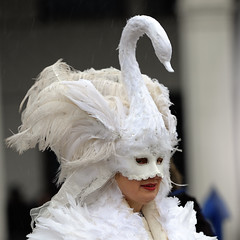 Beatriss has felt a growing antipathy toward Khanbaliq— the constant noise of construction, destruction, and more construction, the draft in her, too-bright room, the odors of moldering food, of the smoke, sewage, and sweat of so many unknown people. And so she went to the Forbidden City to visit Tetsukichi’s fiancée Su-Laing. As she looked forward to her wedding, Su-Laing also resented the feeling of the city closing around her. Rather than shuffle around a palace in slippers, she wanted to charge a horse across the steppes. So it was agreed, Su-Laing would ask to be married at a sacred spot on the plain of horses, surrounded by all the members of her clan. And Beatriss of course would go with them.
Beatriss has felt a growing antipathy toward Khanbaliq— the constant noise of construction, destruction, and more construction, the draft in her, too-bright room, the odors of moldering food, of the smoke, sewage, and sweat of so many unknown people. And so she went to the Forbidden City to visit Tetsukichi’s fiancée Su-Laing. As she looked forward to her wedding, Su-Laing also resented the feeling of the city closing around her. Rather than shuffle around a palace in slippers, she wanted to charge a horse across the steppes. So it was agreed, Su-Laing would ask to be married at a sacred spot on the plain of horses, surrounded by all the members of her clan. And Beatriss of course would go with them. href="http://www.flickr.com/photos/lilith-ivory/2387846636/">Bird Song
href="http://www.flickr.com/photos/lilith-ivory/2387846636/">Bird SongOriginally uploadeddddddddddddddddddddddddddddddddddddddddddddddd by Lilith Ivory
After a few days living on the compound, Beatriss accepted Sheevani’s invitation to participate in the evening studies conducted at meditation hall. She accepted the invitation. What she saw made her rethink Cair’s insinuations regarding the “changes” that had happened in Gwinch’s absence. Besides the ample supplies of food and beer, what surprised her most was that the religious instruction was provided by young women who, while wearing monks’ robes, did not show advanced understanding. The samurai, however, were very attentive when they read from the sacred texts.
Beatriss asked Sheevani for an escort and guide and went to visit Gwinch at the monastery of Sensei Luche, two hours away from the city. She was welcomed there and she met Gwinch. Gwinch confirmed Sheevani’s explanation of his whereabouts. Gwinch knew about the evening studies—he had brewed the beer. As long as the money was collected by donation, he was ok with it. On the way home, Beatriss and her companions spied a white crane standing in a large pond. The monks stood in silence and watched the bird until it flew away. For the rest of their journey home, Beatriss heard the monks whispering that the grace of a crane, while less obvious than that of a swan, was ultimately more beautiful, at least to a man of enlightenment and understanding.
Wednesday, August 25, 2010
down? (Pavel & co.)
At both ends of the hobgoblin's lair-- the treasure room and a fetid rat's den behind a secret door-- we found a flight of stairs going down. And that's where we need to go next.
Friday, August 13, 2010
Cheating Death
Tuesday, July 27, 2010
nobody here but us rats
Pavel and his companions returned to the Keep, sold some jewelry and recruited some new hirelings. And then they returned to the Caves.
We’ve re-entered the hobgoblins lair, but so far it seems to have been abandoned. Hoping to evade any sentries, we entered through the chimney and found a small flock of blood-sucking birds nesting there. The ashes in the fireplace were cold. The dining hall tables had been broken up to barricade and booby-trap the front entrance. We returned to a secret room we’d located in our last expedition, and found nothing inside but half-starved rats. In what we guess was the former sleeping chamber of the hobgoblin chief, we met and destroyed a ghoulish, undead monster. By its features, this may have once been the chief himself.
Saturday, June 19, 2010
The Keep on the Borderlands
Sunday, May 9, 2010
D&D 3.5
And so, recently I've sought out other people to play with. This was my first experience playing 3.5. My knowledge of it was based largely on the assessments of its detractors, so I was curious to see for myself. My personal mix of Moldvay/1e/2e suits me fine, so questions of conversion are irrelevant, but there are a few ways that I might make my campaign even a little more syncretic . . .
1) Flanking. It makes sense, it’s easy to implement, and it adds significant tactical interest. Just like it’s much easier to attack something when you’re sneaking up behind them, it’s also a little easier when you and a friend are attacking them from opposite sides. If +4 makes sense from behind, then +2 makes sense flanking. And it encourages players to visualize the scene (probably via miniatures or markers) in order to get that advantage.
2) A player can take on some traffic-direction duties in combat. Maybe not particular to 3.5, but to this DM’s style. He used individual initiative. In 3.5, you roll it once which makes it easier than rolling every round. And the DM’s helper cycled through, giving each person their “turn.” I’m going to try this. More often I make everything happen at once, but that requires me to keep a lot in my head, and results in longer periods of radio silence than I would like.
3) Think about attacks of opportunity. I’m not going to try to use the 3.5 rules, but I will think about the ways that certain actions might allow one’s adversary a “free attack.”
Tuesday, April 6, 2010
Gwinch in the ruins of the old city
This created its own problems. As more sohei became invisible, the maids of Gwinch’s household began having problems with “spirits.” While Gwinch answered the maids cries for help, the invisible sohei became increasingly ruthless—threatening to kill women who didn’t remain quiet in the face of their advances. Gwinch was more than ready when the time to visit Jourdain’s house arrived.
The Hop Sing (a.k.a. Dirty Rain) gang, had made a claim to the House, with about two dozen of their members camped throughout the ground floor. They were in the process of converting it into a tavern and brothel, and offered Gwinch and associates a promotional discount. But they were also willing to accommodate a desire to kill monsters. The party was admitted in to the dining room, barricaded inside, and told to remove the pile of rocks blocking a hole in the fireplace. Gwinch devised a nice trap to control the outflow of ghouls to about one or two at a time, to be easily dispatched by superior numbers. But the trap malfunctioned a couple times and when this happened, Gwinch lost two sohei . Gwinch decided to take their bodies to the Temple of the Two-Fold Path.

Sheeva was caustic at first, asking the monks around her whether any of them wanted to join Gwinch and get killed. But Gwinch was supplicant, and an agreement was made that Sheeva would accompany Gwinch to his house while the monks prepared their brothers’ bodies for a funeral, and that this would occur the next day.
Back at Gwinch’s house, Sheeva explained that the temple was in such bad place because of the extortionary activities of the various gangs who ruled the ruins of the city. She wanted to go back to the Kobar valley. Gwinch was willing to accompany her, but he was duty-bound to assist in preparing a banquet. So they advised a better plan—Gwinch would insinuate that Sheeva had fled the city, so that her enemies would seek her outside while she was in fact laying low at Gwinch’s house. So Gwinch returned to the temple with Saisho and a group of sohei, to start the rumor and to perform the funeral.
The monks heard the news with anger, certain that Sheeva had stolen from them. Ali, a secular man who resided at the temple, heard Gwinch’s story and responded with shock and outrage, but did not resolve to do anything, suggesting blithely that Gwinch should “just do the funeral himself.” In the course of his short visit, he saw other signs of the temples weirdness. There were twin monks who accussed and attacked each other. And there was talk about the flying creatures in the garden whom some wanted killed and others thought should be protected. At last the funeral was conducted outside the temple, in a clear spot among the ruins.
Gwinch agreed with Sheeva that she should be his teacher and this involved allowing her to stay in his room, while he went to stay with the maids. (They were honors to have the master protecting them from the spirits.) And then he decided to make another foray to the House of Jourdain.
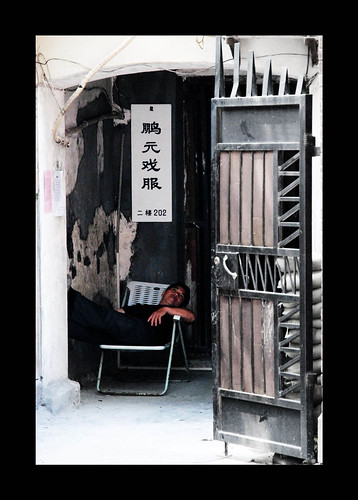
Won Lee, of the Sing Hop gang explained that he and his men had dealt with the rest of the ghouls themselves. If they were interested in exploring the basement, they would need to accompanied by some of his men who would expect a share of the treasure. Also, he was required to secure their safe return by leaving a sum of insurance money. Gwinch had no money and so hostages were accepted as a substitute.
In the cellars, they came upon a group of humans adventurers who seemed more or less normal except that they were fast asleep in a dank musty cellar room and that the women in their group was wrestling in her sleep with a fox. When the party entered the room, the fox fled, and the sleepers awakened. The woman was distressed that “Omesa” was gone, while others were distressed that the sumptuous banquet they had just enjoyed was in fact nothing more than cobwebs and dust. The leader of the group was a member of the diplomatic mission from Zipang—he and Gwinch made a mutual agreement to keep each other’s presence in the house of Jourdain a secret and to meet in the future to discuss the mysterious fox.
Sunday, April 4, 2010
Play report: More intrigue in Khanbaliq
In the weeks that followed, while Kishi was off on secret business of her own, the new sohei made themselves at home in Gwinch’s compound. The quarters were tight, but the food was plentiful, and while one disappeared, the other 14 remained. They explained that things weren’t good at the Temple, and that Sheeva, the foreign priestess was keeping all the Temple’s money for her own use. Kishi and Gwinch resolved to make a reconnaissance mission to find out more.
Before they could put the plan into effect, Saisho alerted them that someone was spying on them. Saisho made them invisible and they chased the spies through the green city, and over a wall into the outer city, where they managed to apprehend one of them. Sure enough, they were from the Temple, and had been sent to see what Gwinch’s teaching were. When pressed, the captured spy admitted that conditions at the Temple were hard, but expressed confidence in his own master. After washing up his wounds a little, they let him go.
And the next day, they made a call at the Temple. The monks at the gate were suspicious, but after some waiting, Gwinch and Kishi were granted an audience with Sheeva. She met them in the courtyard, then walked them down a corridor lined with fearsome statues and into the great temple room—a three story chamber dominated by the monumental statue of a robed figure holding a sword. Sheeva was supercilious and curt; after silencing Gwinch with her magic, she lectured him on the place of adversity in seeking enlightenment and on the paramount importance of respecting his superiors. She suggested that he should invite her to his compound so that she could further enlighten him.
Saturday, April 3, 2010
play report: martial arts tournament in Khanbaliq
The Emperor (and Great Khan)summoned the representatives from Zipang to a private audience within the Forbidden City. Among them was Gwinch, whose reputation as both diplomat and fighter had reached the court.
The Emperor explained that an important visitor from Zipang
would soon arrive—a mission of delicate political significance—and he intended
to host a grand banquet in their honor. Because Gwinch understood the customs
of Zipang but was not yet entangled in its factional rivalries, the Emperor
entrusted him with a subtle task: to devise the seating plan. Each arrangement
would signal honor or insult; Gwinch’s choices could set the tone for an entire
season of diplomacy.
During these preparations, Gwinch became acquainted with Cair
and Myrrha, who were themselves still adjusting to the strange blend of
hospitality and surveillance that defined life in the Forbidden City. Gwinch
found that Cair and Myrrha spoke a language that while crude, almost childish, was
to him completely intelligible; for their part, Cair and Myrrha understood at
least some of what he said in Alyan. Thus, they were able to converse freely in
front of Cair and Myrrha’s handlers.
Gwinch learned of Cair’s kinship with the late Lord
Jourdain and the pair’s quiet ambition to secure wealth enough to leave
Khanbaliq. Cair, in turn, spoke with interest about Gwinch’s invitation to
participate in the coming martial arts tournament—an imperial contest of
strength and discipline held once every few years. He offered to provide a
minor enchantment, a subtle ward or charm to quicken reflexes and steady
breath.
Gwinch accepted.
The tournament opened on the steps of the Hall of
Heavenly Balance, beneath banners of red and white silk. The first test was
endurance: each competitor was required to stand motionless through a series of
ceremonial speeches that stretched well into the afternoon heat. Dozens
faltered; a few collapsed. Gwinch endured, silent and still, the faint gleam of
sweat on his temple the only movement.
Next came the test of reflexes—dodging a flurry of
blunted arrows fired from mechanical bows. He moved lightly through them,
letting the shafts pass close enough to ruffle his sleeves. Observers murmured
that the foreigner from Zipang fought as if guided by an unseen rhythm.
When the true bouts began, politics entered the arena.
Gwinch’s first opponent was Uesugi Kenchu, a former retainer of Sato
Masoko, who had once been Gwinch’s ally and mentor in Zipang. The match was
more than sport—it was an act of vengeance.
Kenchu was a seasoned samurai, disciplined and proud, and he
fought with a speed that betrayed his own magical aid. Yet Gwinch, strengthened
by Cair’s charm, met him blow for blow. The contest was brief and
brutal. Dust rose around them; spectators gasped as the outlander drove his
rival to his knees.
The Emperor (and Great Khan)summoned the
representatives from Zipang to a private audience within the Forbidden City.
Among them was Gwinch, whose reputation as both diplomat and fighter had
reached the court.
The Emperor explained that an important visitor from Zipang
would soon arrive—a mission of delicate political significance—and he intended
to host a grand banquet in their honor. Because Gwinch understood the customs
of Zipang but was not yet entangled in its factional rivalries, the Emperor
entrusted him with a subtle task: to devise the seating plan. Each arrangement
would signal honor or insult; Gwinch’s choices could set the tone for an entire
season of diplomacy.
During these preparations, Gwinch became acquainted with Cair
and Myrrha, who were themselves still adjusting to the strange blend of
hospitality and surveillance that defined life in the Forbidden City. Gwinch
found that Cair and Myrrha spoke a language that while crude, almost childish, was
to him completely intelligible; for their part, Cair and Myrrha understood at
least some of what he said in Alyan. Thus, they were able to converse freely in
front of Cair and Myrrha’s handlers.
Gwinch learned of Cair’s kinship with the late Lord
Jourdain and the pair’s quiet ambition to secure wealth enough to leave
Khanbaliq. Cair, in turn, spoke with interest about Gwinch’s invitation to
participate in the coming martial arts tournament—an imperial contest of
strength and discipline held once every few years. He offered to provide a
minor enchantment, a subtle ward or charm to quicken reflexes and steady
breath.
Gwinch accepted.
The tournament opened on the steps of the Hall of
Heavenly Balance, beneath banners of red and white silk. The first test was
endurance: each competitor was required to stand motionless through a series of
ceremonial speeches that stretched well into the afternoon heat. Dozens
faltered; a few collapsed. Gwinch endured, silent and still, the faint gleam of
sweat on his temple the only movement.
Next came the test of reflexes—dodging a flurry of
blunted arrows fired from mechanical bows. He moved lightly through them,
letting the shafts pass close enough to ruffle his sleeves. Observers murmured
that the foreigner from Zipang fought as if guided by an unseen rhythm.
When the true bouts began, politics entered the arena.
Gwinch’s first opponent was Uesugi Kenchu, a former retainer of Sato
Masoko, who had once been Gwinch’s lord in Zipang-- until they became lethal enemies. The match was
more than sport—it was an act of vengeance.
Kenchu was a seasoned samurai, disciplined and proud, and he
fought with a speed that betrayed his own magical aid. Yet Gwinch, strengthened
by Cair’s charm, met him blow for blow. The contest was brief and
brutal. Dust rose around them; spectators gasped as the outlander drove his
rival to his knees.
When the match ended, Gwinch saluted his fallen opponent
with formal respect. The crowd roared approval, and for that moment at least,
the mysterious stranger was no longer an outsider.
________________________________________________________________________
We played this session as a mashup of Princes’ Kingdom and D&D. The mechanics of The Princes’ Kingdom do a better job than D&D with non-lethal physical challenges. The tournament began with a series of speeches that doubled as test for stamina, weeding out the less qualified contestants. Instead of rolling a couple con checks, the players played from a pool of dice, calling on their previous experiences as the hours of speechifying wore on. I used the rules again for the test of speed and the test of reflexes. Rolling a dex check just doesn’t work for bringing out the drama of dodging a volley of arrows. And while the module I was using exhorted the DM to fully describe the events, it’s a much better tactic to ask the players to do some of the work of describing what they do and what happens to them. Another advantage was that my (then) six-year-old son could join as Bucko, a street urchin who did surprisingly well in the tournament.
Monday, March 29, 2010
Return to the House of Lord Jourdain (Part II)
In the week following the first expedition, word spread quickly through Khanbaliq that Beatriss and Tetsukichi had lifted the curse of the foreign lord. The rumor grew with each retelling. By the time the new party set out, a small procession trailed them through the Outer City.
Outside the southern gate they found an even larger crowd—nearly two hundred people scattered across the floodplain between the new walls and the river. All eyes were fixed on the dark outline of Jourdain’s ruined compound. None dared draw too near; spectators watched from trees or from the shells of other buildings a hundred paces off. As Beatriss’s group advanced, the hangers-on melted away until only the bravest lingered at the gate.
There they met a band of a dozen armed men, self-appointed guards of the place. Their leader, Ho-Jun, and his lieutenant Chong, claimed they were keeping the city safe—nothing comes out, nothing goes in. Exceptions, of course, could be made for heroes. After a brief exchange they joined the expedition, swaggering and eager for glory.
Inside, the rooms of the ground floor were unchanged: silent, dust-coated, and now strangely mundane without the presence of Jourdain’s spirit. Ho-Jun and Chong helped force open several doors and quickly claimed the choicest bottles from the old wine cellar. The others searched for valuables with more restraint, then climbed to the upper story.
Behind one locked door they heard a woman’s voice.
“Jourdain? Please. I forgive you. Let me out.”
When Beatriss answered, “It isn’t Jourdain,” the tone changed. The voice became a snarl, and a gray, vengeful figure stepped through the wall. Between Cair’s spells and the swords of Beatriss and Tetsukichi the spirit was banished. Behind the door they found her mortal remains—a long-dead woman, still adorned with jeweled rings. The jewels were taken, and the party withdrew. Ho-Jun and Chong gathered more liquor on the way out. Outside, the crowd greeted them as victors.
They returned the next morning, intent on a thorough survey. The opportunists had been busy: two guards now stood before the padlocked gate collecting “safety fees.” After paying, the party entered and found Ho-Jun, Chong, and several companions already inside, drinking and entertaining women from the city. Most were incapable of standing; the house reeked of spilled wine and burning opium. Still, Ho-Jun insisted on joining the explorers again, and one of the women demanded to see the upper floors. No one refused her.
The exploration was brief and disastrous. In the library, a concealed panel gave way to a hidden chamber. The instant the secret door opened, there was a muffled blast—a gout of fire and dust that killed Ho-Jun and the curious woman outright. Beyond the smoke, the survivors discovered the preserved corpse of Lord Jourdain, a cabinet of magical instruments, and within a chalk circle on the floor, a seated figure—Bayemon, the demon.
The creature raised its head and spoke with a voice that was both courteous and venomous. It asked to be released. Beatriss refused. Tetsukichi, though tempted to question it further, obeyed her word. No one was permitted to touch the corpse or the artifacts.
Bayemon smiled.
“Someone will free me in time,” he said. “I will remember those who refused.”
The group backed away and sealed the door. They continued through the upper floor, defeating an invisible guardian that lingered near the room of a dead magician, and carried off what treasure they could manage.
Wounded and burdened, they made for the exit. In the entry hall Chong confronted them, furious at the loss of his companion. When they admitted Ho-Jun’s death and offered ten taels in compensation, he demanded the whole purse. The party retreated toward the gate, Chong and his men in pursuit.
At the last moment Cair raised his hands and muttered a spell; the padlock on the gate burst open with a crack. The adventurers slipped through, slamming the doors behind them. The mob outside parted in confusion as they fled across the floodplain, smoke rising once again from the house of Lord Jourdain.
Addendum – The Mirror Room of Lord Jourdain
It had happened late in the day. The party had already discovered the hidden library and sealed away the demon when they came upon another narrow corridor lined with warped mirrors. Most were cracked or filmed with dust, but one—taller and framed in tarnished bronze—still caught the light.
From within its surface pulsed a dim gold radiance, faintly rhythmic, like breath. Tetsukichi, ever curious, leaned closer to study the glass. The glow intensified, the reflection bending and twisting until the others could no longer see him clearly. Then, with a soundless flash, the light burst across the hall.
When it faded, Tetsukichi stood blinking, unharmed—but his hair had turned the color of pale straw. Afu whispered that the mirror had contained a spirit of reflection, a remnant of Jourdain’s curse, one that revealed not appearances but inner essence. Tetsukichi tried to laugh it off, but Beatriss noticed his unease—the way he avoided his reflection as they left the room.By the time they returned to Khanbaliq that evening, he was quieter than usual. Walking through the narrow streets near the southern gate, he flinched at the sound of dogs barking in the distance. When
Beatriss asked what was wrong, he hesitated before answering:
“They’re not barking at us. They’re arguing about supper.”
She stared, unsure whether he was joking. But as they passed a cluster of caged birds outside a wine shop, his expression changed again—listening, understanding. From that day, Tetsukichi began to hear the voices of animals, not as sounds but as words: curt, emotional, alive.
Friday, March 19, 2010
Return to House of Lord Jourdain (Part I)
 When Beatriss followed the invitation to meet someone "like her", she found the priestess waiting. Myrrha was a woman of striking presence—perhaps near Beatriss’s age, but darker of complexion, with brown curly hair, a foreigner from lands to the west, yes, but not one who had spent her childhood underground. The two woman shared an awkward laughed at the idea that they resembled each other.
When Beatriss followed the invitation to meet someone "like her", she found the priestess waiting. Myrrha was a woman of striking presence—perhaps near Beatriss’s age, but darker of complexion, with brown curly hair, a foreigner from lands to the west, yes, but not one who had spent her childhood underground. The two woman shared an awkward laughed at the idea that they resembled each other.Myrrha greeted her in several tongues, one of them uncannily close to Cynidicean but not quite right—like a melody she half-recognized but could not sing. When words failed, they settled into Zhou-dang, speaking carefully.
Cair, the man who had offered the invitation, was there as well, standing by the door. When Beatriss asked his purpose, he explained with measured pride that he was a descendant of Lord Jourdain himself. Their common ancestor, he said, had traveled from the west to Zhou-dang and taken two wives, one whom he left behind when he returned to his homeland with the other. The families had long diverged, but Cair had come east to pay respects at the ruin of his ancestor’s house—and perhaps to understand why it had not rested easily.
 He confessed that the welcome he had found in Khanbaliq was colder than expected; he was much a foreigner here as he had been in the land of his birth. And he wasn't sure whether he was a guest or a prisoner. He wished to see the place that bound his blood to this country, and perhaps recover a token of its history.
He confessed that the welcome he had found in Khanbaliq was colder than expected; he was much a foreigner here as he had been in the land of his birth. And he wasn't sure whether he was a guest or a prisoner. He wished to see the place that bound his blood to this country, and perhaps recover a token of its history.
An understanding soon followed. Beatriss, Tetsukichi, and Hatsu would accompany Myrrha and Cair on a second expedition to the House of Jourdain. Su-Laing’s relatives in the House of Mehwa arranged the necessary permissions for Myrrha and Cair to leave the Forbidden City. They made little effort to hide their own interest in the venture: the foreigner’s sense of “filial duty” might be sincere, but if treasure remained in that haunted place, it would be better found by their allies than by strangers. Askaa and Ganbold were assigned to represent the family’s claim.
By week’s end, the new party was assembled—seven travelers bound again for the southern floodplain and the ruin where the dead had not yet learned to stay buried.
Sunday, March 14, 2010
Play Report: The House of Lord Jourdain (Part IV)
After poking around in the drinking parlor, the party decided to see what might have happened to Beatriss. They went back into the courtyard and saw two of Jourdain’s hounds, both standing tentatively in the arch of the now open gate, one of them holding something in its mouth. The party fired a volley of arrows and both hounds, turned and barked threateningly (the one dropping the thing in its mouth), but after being hit with a couple more arrows, ran away—out the gate.
The “thing in its mouth” turned out to be boot—chewed and charred, but still with traces of blue dye, and a couple of crushed bells attached.
The party left the compound, and found Beatriss, distraught over what she had done, but reconciled with her more customary perceptions of reality. Relieved to have escaped and with some evidence of what happened to Ikhbayar , the party decided to retrieve the bodies of Qasqari and Hajip and then returned home. Even in the ruins of the old city, carrying dead bodies invites questions. The party freely explained where they had been. And that wicked man was supposed to be rich? Maybe. They hadn’t found anything worth taking.
Back at the House of Mewha, there were questions about money. Tetsukichi gave the boot to Su-Laing and left with her the job of deciding what to tell Kei-lo.

Finally, on her way out of the forbidden city, Beatriss was approached by a shadowy man with a message. A priestess named Myrrha, who had quarters in the forbidden city would like a meeting at her convenience. The man pointed out where Myrrha could be found and then slipped away.
Friday, March 12, 2010
Play Report: The House of Lord Jourdain (part III)
"These hounds of mine are like nothing that walks the earth—lean and muscular, large as ponies, with black mouths and black teeth. When they bark, they breathe fire. But my visitors had spirit. They killed three of the pack and drove the other two off. There is no use for a beaten dog but to butcher it for the servants, yet the pale lady, sick with pity, let those two escape.
"No matter.
 "My guests wandered back to the ground floor, then climbed to the upper rooms, snooping through the bedchambers. They found many locked doors, which of course only made them more determined to enter. And who should come sashaying down the corridor but Landri—faithful Landri—shaking his great ring of keys the way he always did. Still making the same jokes to “guests” who mistook him for a servant: someone asking for a softer mattress, a glass of water, a little favor for their comfort. These newcomers were no different. They had misplaced one of their friends and imagined he must be behind one of those locked doors.
"My guests wandered back to the ground floor, then climbed to the upper rooms, snooping through the bedchambers. They found many locked doors, which of course only made them more determined to enter. And who should come sashaying down the corridor but Landri—faithful Landri—shaking his great ring of keys the way he always did. Still making the same jokes to “guests” who mistook him for a servant: someone asking for a softer mattress, a glass of water, a little favor for their comfort. These newcomers were no different. They had misplaced one of their friends and imagined he must be behind one of those locked doors.
"When they saw Landri and his keys, they displayed their perfect stupidity. The priest among them puffed out his chest, lifted whatever holy trinket hung around his neck, and commanded this poor, tortured soul to return to “the place from which he came.”
"I might have told him: Excuse me, your holiness, but I haven’t given Landri a day off in nearly a hundred years. He isn’t going anywhere. And aren’t those the very keys you want?
"Completely unnecessary. Landri never did listen to sermons. And never did a fat priest lose so much weight so quickly. After one touch from Landri’s hand, the priest went pale and hid again behind the warriors. Then the pale lady drew her sword, and that was the end of poor Landri.
"Well—I told him to keep the door locked to my wine cellar."
Wednesday, March 10, 2010
Play Report: House of Lord Jordain (Part II)
"When I saw them approaching the house, I knew they were more than lost travelers or timid, second-hand curiosity seekers. They had a certain look in their eyes. A look showing ignorance of those who had entered this house beforehand and died without a sympathetic witness. No, even better, the look of those who hear all the tales, all the warnings, and come anyway. My favorite kind of company.
"The pale lady I’d seen before. And as much as I wanted to see her die when I first saw her now I wanted it even more. She pried the boards off the gate herself. Once inside the gates, she consulted with one of them. He was a foreigner, too by his arms. He wore a laced breastplate from Zipang like the one my father left for me. This one, the Zipangese warrior, he nodded in the direction of the house.
And so the pale lady walks up to the front door and opens it, without a half-step, without a cocked ear. Not like a burglar, but like someone who thinks she has a right to something. Or like a child hoping her stomping feet will scare away the ghosts before he enters a room.
"Sorry pale lady! The look on her face when the statues leapt off their pedestals will stay with me for centuries. The Zipangese man's shock when of pain when he landed a solid blow on more solid stone. But the pale lady’s sword carried ancient enchantments, and soon one of my stone guardians lay shattered across the marble floor.
The uninvited guests passed from the foyer to the dining hall, where they cut down my poor, half-starved servants. Then through the kitchen and down to the cellar they went. What did they seek? And why were they so easily defeated by a simple locked door? That gave me some amusement.
But the true sport began when my hounds caught their scent.

Tuesday, March 2, 2010
Play Report: Khanbaliq 1272 - The House of Lord Jourdain (Part I)
In the imperial capital of Khanbaliq, still half-built upon the ruins of an older city, Tetsukichi found himself drawn into delicate obligations. His affair with Su-Laing, daughter of the late and dishonored Lord Mehwa, had become public enough that her extended family began to speak of marriage. To them, the match was both convenient and risky — an opportunity to secure Su-Laing’s future while quietly aligning their tainted name with a foreigner who had once saved her life.
But they made no secret of one expectation: if he were to be her husband, Tetsukichi must not be poor.
So when talk turned again to the disappearance of Ikhbayar, the guardsman once in love with Su-Laing’s handmaiden Kei-Lo, Tetsukichi saw a chance to satisfy duty, curiosity, and ambition at once. Kei-Lo believed her lover had entered the ruins below the city — into the House of Lord Jourdain, once the mansion of a foreign noble said to have trafficked in dark arts — searching for treasure to buy his freedom. He had never returned.
Tetsukichi resolved to go himself: to learn the truth of Ikhbayar’s fate and, perhaps, to recover what wealth or relics the old house might still conceal.
Beatriss agreed to accompany him. The expedition also included Afu, a priest versed in purification rites; his apprentice Ju-May; four hired guards; and Hatsu, Tetsukichi’s old comrade from Zipang — nine in total.
Before they departed, Afu performed divinations and named an auspicious morning for the venture. But when that morning arrived, Beatriss was too weak to rise. Her skin was cold, her pulse faint. They delayed the expedition. As her strength returned, she resumed her Blackbird exercises, the disciplined movements she'd learned from a tengu in Zipang. During her recovery she met Kwan Wan Lo, a visiting martial artist preparing for the Imperial Tournament, who praised her technique and urged her to compete.By then, Omesa, her guest from Jangze, had vanished. He left no farewell.
When Beatriss was restored, the company finally rode beyond the southern walls, across the muddy floodplain where the ruins of the old city lay half-sunken and overgrown. Among the broken foundations stood two surviving structures: the Temple of the Two-Fold Path and, not far from it, the House of Lord Jourdain.
It was there, according to Kei-Lo, that Ikhbayar had gone seeking fortune — and where Tetsukichi and Beatriss would soon follow, searching not only for a lost man, but for something worth the risk of love and ruin alike.

Friday, February 26, 2010
once more against the spiders! (The Second Journey to Jangze (1272))
Beatriss kept her word.
A month after the disastrous first expedition, she set out again to fulfill her promise to the guards of the House of Mehwa—to find and recover the body of their fallen master from the spider-haunted forest. This time the party was smaller: the dead man’s son-in-law, a priest of the Imperial Temple, and several loyal guards who carried both grief and duty in equal measure.
They met in the Outer City of Khanbaliq, where soldiers, traders, and pilgrims crowded the narrow streets between earthen walls. As they prepared to leave, a monk from the Monastery of the Two-Fold Path approached Beatriss. His robes were travel-stained, his manner urgent but respectful. He said he sought a foreign warrior monk named Gwinch, and had learned that Gwinch’s household lay within the Middle City—the same compound where Beatriss herself now lodged. The monk asked the party to turn back and escort him there before continuing on their mission.
It was an inconvenient request, but Beatriss agreed. The detour delayed them half a day. She guided the monk through the southern gate, across the canal bridge, and to the walled quarter where Gwinch kept his residence among other foreigners and mercenaries in imperial service. Gwinch received the monk courteously. Beatriss left them together and returned to her companions outside the city walls. She told herself it was a small thing—yet she could not shake the sense that she had set something in motion.
The road to Jangze was rough with thawing mud. They passed the ruined monastery in the western hills, where a skirmish crackled among the stones. Beatriss looked once, then rode on. Later that day they met six men stumbling north in terror. They spoke only of shapes in the branches and would not stay to explain.
By dusk they reached the Spider Forest. The priest performed his divination, locating the remains among three silk-bound cocoons hanging high in the canopy. None could tell which body was Lord Mehwa’s.
While the guards debated how to reach them, a voice called from the shadows—calm, amused, familiar.
Omesa.
He stepped into the fading light, dressed in rough traveler’s clothes, smiling as though their reunion were inevitable. He offered to climb the tree himself, claiming he could move unseen by the spiders. Without argument, Beatriss handed him her sword.
He climbed like a shadow through the limbs. When he called for help, she followed, boots slipping on the slick bark, the smell of silk and decay thick around them. Below, the guards stood watch. A spider as large as a horse dropped from the canopy, scattering them. The priest shouted a warning and rolled aside; the others speared the creature through its belly until the green ichor hissed on the leaves.
When the noise faded, Omesa and Beatriss were already cutting the cocoons free. Three bodies struck the ground heavily. The priest identified one by its armor as Mehwa. The others were strangers. The living stripped the dead—coins, weapons, a robe that seemed untouched by time—and the priest recited the rites for all three.
By nightfall they had cleared the forest. Omesa asked to accompany them back to Khanbaliq, and Beatriss, tired and unguarded, agreed. They camped together in the hills east of the chasm, where the wind smelled of ash and cedar.
There they met another wanderer: a gaunt man in an iron yoke, a debtor escaped from the mines. He begged for food and freedom, promising service in return. Beatriss fed him, and in the morning broke the lock. He swore to serve for a year before seeking his home in the Kobar Valley.
When they returned to Khanbaliq, Gwinch received Omesa as a guest and took the freed prisoner into his household as a servant. The priest declared the mission complete, and the Mehwa guards departed.
Beatriss said little. She had kept her promise, but her dreams were restless. The monk, the fox, the forest—each had found its way inside the walls.
Thursday, February 4, 2010
Report: Exploring Khanbaliq
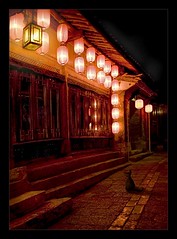
red moons
Originally uploaded by biancavanderwerf
Gwinch received several visitors one morning: Gamo (senior) had sent his son (“Little Gamo”) as a household guard; a new laundress whom Gwinch soon recognized as Kishi; Beatriss, returned from her sojourn to Jangze.
These four, plus Saisho and three of Gwinch’s sohei went to survey the burned-out remains of Gwinch’s building project. He interpreted the rumors blaming Beatriss for the sudden fire as evidence of a combination of arson and slander.
Next, the party travelled beyond the walls of Khanbaliq to explore the ruins of the old city, in particular, the local Temple of the Two-Fold Path. Gwinch is a monk attached to a Two-Fold Path in Zipang and his superiors had sent him to Khanbaliq with a package for their sister temple. Because he’d been “quested” to deliver the package to the temple, Gwinch was anxious to discharge his responsibility, but he had some concerns. In an earlier visit, he’d found a strangely unwelcoming and deadly booby-trap near a secret entrance. So the party decided to set up a camp in the ruins a couple hundred yards away.
At their encampment, they were met by a beggar with whom they shared their food. During the conversation, Saisho used various spells to determine that this beggar’s mud-encrusted boots were in fact magical, having been created by the cat people to give the wearer silence in his movement. When Gwinch showed an interest in the boots, the beggar took his leave.
About an hour later, the party was visited by a gang of about a dozen toughs, looking to collect camping fees. When they became threatening, the party responded decisively, put the gang to flight and chased down and killed all but two or three of them. This attracted the attention of some months from the temple. Their interest in the dead bodies was neither especially positive or negative, but they were intrigued to meet “one of their own”—wearing Two-Fold robes, whom they did not recognize. The party accepted their invitation to the temple.
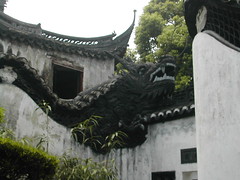 There they met Sheevani, a woman who introduced herself as the leader of the temple. She explained that she was not of the Two Fold Path, but that her own sect, brought with her from Manicea was very similar in the major tenets, and so they had formed an alliance. She accepted the package (a metal box) and was grateful for Gwinch’s offer of help. After a meager meal, the party departed.
There they met Sheevani, a woman who introduced herself as the leader of the temple. She explained that she was not of the Two Fold Path, but that her own sect, brought with her from Manicea was very similar in the major tenets, and so they had formed an alliance. She accepted the package (a metal box) and was grateful for Gwinch’s offer of help. After a meager meal, the party departed.They explored the ruins a little and found a large, intact house, surrounded by a high wall, its gate marked with various warnings. As dusk approached, they began to hear groaning and snarling coming from inside. They decided not to enter, and after passing by the Temple once more to see what happened there after dark (just some birds) they returned to the confines of the city.
The next day, Beatriss was visited by the guards from the House of Mehwa—they had forgotten to retrieve the master’s armor! It had been their duty to retrieve it, but in the excitement of the spiders and the weird house in the deserted village, they had forgotten. And none of them knew where he had fallen. Beatriss agreed that if they could wait a couple days, she would take them there.
In the meantime, the party decided to investigate the “poem” problem. While they had laughed off the series of insulting poems about them that had been posted in the green zone, they were now moved to do something about it. They began to become suspicious of Gamo, the one who had urged them to take action. By staking out his house, they confirmed that their “mentor” was in fact behind it, apparently trying to manipulate them into a feud against another family. In the process, they observed that another samurai, was in fact searching for them with the intent of avenging the death of his master Sato. This was Uesugi Kenchu, whom Gwinch had observed at the House of Lucky Dragon.
The party accompanied Kishi on a visit to herbalist in the Outer City. In the cellar herbalist, they met members of masked group who, without identifying themselves, thanked them (with a nice sum of cash) for their past service and enlisted their support for an up-coming mission to track down two traitorous generals in Chun Yuan province.
Finally, in the midst of these intrigues, a representative of the Emperor announced an up-coming martial arts tournament. None of PCs seemed interested in participating.





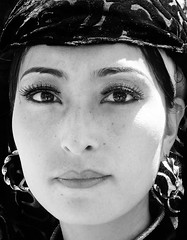








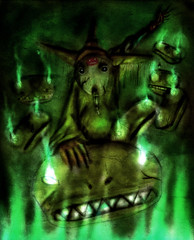

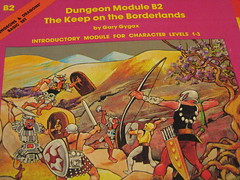

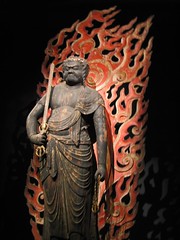

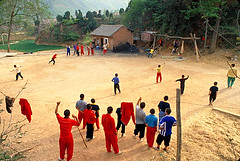







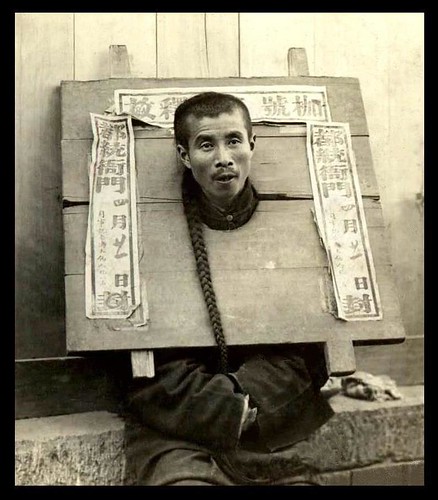
.png)
